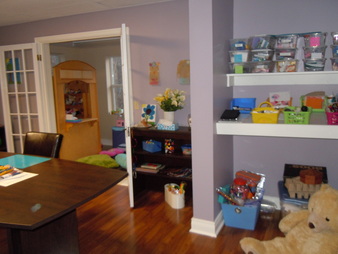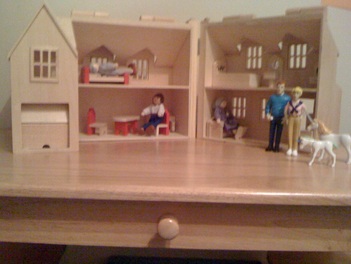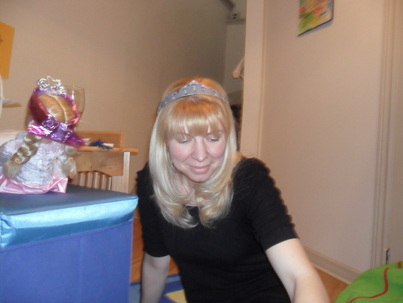Play Therapy - A child's most natural form of expression

Play based counselling encourages the expression of a child's feelings, experiences, and cognitive functioning in a non-threatening manner.
A combination of directive and non-directive approaches are used according to the specific needs of the client. Activities are geared towards the developmental level of the child.
Children can chose from items such as puppets; various people, animal, and vehicle figures; costumes/role playing materials; books; and therapeutic games.
A combination of directive and non-directive approaches are used according to the specific needs of the client. Activities are geared towards the developmental level of the child.
Children can chose from items such as puppets; various people, animal, and vehicle figures; costumes/role playing materials; books; and therapeutic games.
Healing Trauma Through Therapeutic Play

Play focused therapy is a therapeutic approach which provides an opportunity for children to ‘play out’ feelings and problems, using toys to symbolically represent their inner and outer worlds. Play is a child’s natural language and way of making sense of their experiences-through the use of play, the therapist can enter the child’s world and communicate with the child at his or her level.
By relying less on language, play focused therapy is a developmentally sensitive treatment modality, and particularly appropriate for children who have experienced trauma. During trauma, the verbal part of the brain shuts down- the experience is stored at a sensory level and words become inaccessible. Play is experiential and allows these memories to be expressed and explored non-verbally so that they can eventually be integrated into a more verbal narrative. Through the appropriate combination of acceptance, attunement and structure, the therapeutic relationship creates a sense of safety. The therapist follows the child’s lead, thereby honouring a child’s pace and readiness to explore trauma-related themes.
Children project their feelings and experiences onto the toys, creating a psychological distance from which to explore traumatic material. Play therapy allows the child to externalize their story, where it can then be better understood and reworked therapeutically, creating a sense of mastery. This empowerment is especially important for a child following trauma, which typically leaves children feeling powerless and vulnerable. During play therapy, the therapist conveys a deep respect for children’s ability to solve problems and make choices, restoring a sense of self-efficacy.
In play focussed therapy, traumatized children learn:
· that the world can be safe, consistent and predictable
· that feelings (both positive and negative) are acceptable
· to trust and attach to other people
· to be creative and resourceful in confronting problems
· develop a greater capacity to cope
· to experience behaviours and feelings of control/mastery
· to develop an internal source of evaluation
· to be more self-directed, responsible and autonomous
· to develop an enhanced sense of self and become more self-accepting
(adapted from Landreth 2002)
By relying less on language, play focused therapy is a developmentally sensitive treatment modality, and particularly appropriate for children who have experienced trauma. During trauma, the verbal part of the brain shuts down- the experience is stored at a sensory level and words become inaccessible. Play is experiential and allows these memories to be expressed and explored non-verbally so that they can eventually be integrated into a more verbal narrative. Through the appropriate combination of acceptance, attunement and structure, the therapeutic relationship creates a sense of safety. The therapist follows the child’s lead, thereby honouring a child’s pace and readiness to explore trauma-related themes.
Children project their feelings and experiences onto the toys, creating a psychological distance from which to explore traumatic material. Play therapy allows the child to externalize their story, where it can then be better understood and reworked therapeutically, creating a sense of mastery. This empowerment is especially important for a child following trauma, which typically leaves children feeling powerless and vulnerable. During play therapy, the therapist conveys a deep respect for children’s ability to solve problems and make choices, restoring a sense of self-efficacy.
In play focussed therapy, traumatized children learn:
· that the world can be safe, consistent and predictable
· that feelings (both positive and negative) are acceptable
· to trust and attach to other people
· to be creative and resourceful in confronting problems
· develop a greater capacity to cope
· to experience behaviours and feelings of control/mastery
· to develop an internal source of evaluation
· to be more self-directed, responsible and autonomous
· to develop an enhanced sense of self and become more self-accepting
(adapted from Landreth 2002)
UA-47665331-1
